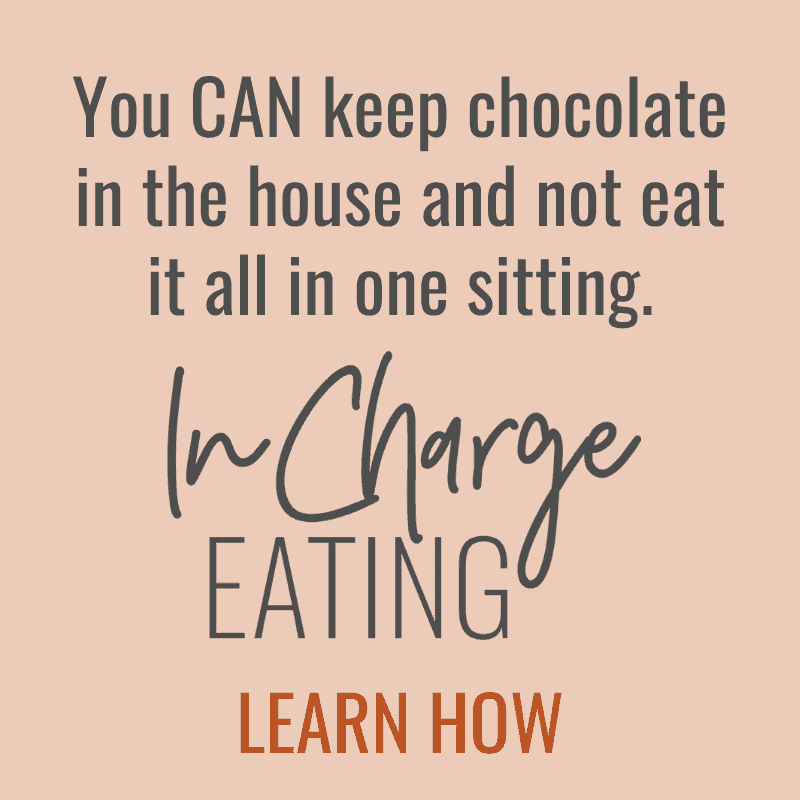Binge eating, overeating or just generally feeling out of control with eating can happen at any time. For some people, they find the weekends particularly tricky. During the week, their eating seems ‘under control’, but when the weekend rolls around, it is like a switch has been flicked and it is suddenly a free-for-all when it comes to food.
So, let’s start with why it might be happening and then get to some things to try to help stop binging on weekends.
Things that leave you vulnerable to a binge on the weekend
There are SO many things that can leave people vulnerable to a binge. Binges or out of control eating on the weekend can be driven by biological factors, emotional factors and habitual factors (or a combination of all three). So, this is not an exhaustive list but includes the common themes that come up for my clients.
Trying to ‘be good’ during the week
There’s a whole article you can read here on why our language around our food and eating matters. When we moralise our food and eating, we end up moralising ourselves and the indiscretions with food and eating on the weekend can send us tumbling down off the pedestal of virtue we have been sitting on during the week. Seeking virtue through our eating and wanting to avoid guilt and shame is the stuff out of control eating is made of.
Subscribing to the concept of ‘cheat meals’ or ‘cheat days’
Adding on to the ‘being good’ point, the weekend is often seen as the allowable time to ‘cheat’ on ‘being good’ (phew- I am getting tired of putting everything in air quotes here!).
What we know from how our body and our brain works, is that once we crack open the door to allow a food or a meal that has been off-limits, we are likely going to make up for what we have missed out on – no matter how much we try and intellectualise that we are allowed to eat it on the weekend.
Because what compounds feeling out of control on the weekend, is our brain and our body knowing that when Monday arrives again, that food is going to be back off-limits, so it better get as much in as it can while it is allowed.
Having weekday foods and weekend foods
Got foods or cuisines that are only allowed on weekends? Those food rules are likely contributing to deprivation driven eating.
So what?
You might be wondering how these factors have anything to do with binging on the weekend. What all three contribute to is restriction. Both the literal restriction of certain foods (that often results in not getting enough to eat) AND the mental restriction that comes with enforcing all of those food rules.
Restriction during the week is like that slow creep up to the top of a rollercoaster. By Friday night, that rollercoaster has reached its peak and can’t hold that climbing pressure anymore, so it hurtles you full-speed into ‘being bad’ with your eating for the weekend.
What was meant to be a ‘cheat meal’ becomes a ‘cheat day’ or blows out to the whole weekend’s eating feeling out of control.
That understandably leaves people feeling pretty awful – physically and emotionally.
And because ‘eating too much’ is considered bad behaviour (there’s that moralising showing up again!) we view the lack of control over the weekend as ‘the problem’. So when Monday rolls around again, we are determined to get back on track and ‘be good’ again.
And so, that rollercoaster is neverending.
What else might increase vulnerability for binging on weekends?
There are also factors that are less food and eating specific that can leave people vulnerable to binge eating on the weekend.
The workweek/weekend dichotomy
Our work weeks are usually structured and routined. And if at a physical workplace, we perhaps have set breaks for meals and snacks. All of which need some planning ahead to be organised with food because we don’t have our pantry and fridge so readily available.
A lot of people also talk about how the structure and busy-ness of the workweek is a distraction from being over-preoccupied about food.
The containment of a weekday can help to make eating consistently happen.*
Weekends can be the total opposite. They are loose, there’s less structure, fewer time constraints, not as much need to plan or organise food and more opportunity for spontaneity with eating. It’s normal for sleep routines to be disrupted on the weekend too, meaning that some meals might be missed (breakfast!!) or we are awake a lot later at night and naturally feel hungry.
Transitions
A lot of people find the transition from the week into the weekend tricky. Friday night, heading into the weekend is a common tricky transition, as for some people, it brings into focus their feelings of loneliness, lack of intimate relationships, social isolation, boredom and a whole other range of thoughts and feelings that can be uncomfortable or painful to sit with.
Using food to soothe, comfort or numb out from those uncomfortable and painful feelings makes a lot of sense.
Alcohol
Alcohol is a known disinhibitor and has been linked to increased binging behaviour – both food and drinking. Alcohol also throws off hunger and fullness cues so it makes staying connected with your body internal signals really tricky.
How to stop binging on weekends
There are a number of things that can be protective and help to stop binge eating on weekends (which hopefully make more sense now that you know what contributes to being more vulnerable).
Eat regularly across the WHOLE week
THE number one place to start is to bring some regularity and consistency to your eating – all seven days of the week.
This doesn’t mean holding rigidly to set meal and snack times at the expense of the spontaneity that comes with eating, but that you are generally having something to eat every 3-4 hours.
Our bodies crave stability and this includes stability with its food supply.
Eating regularly is essentially an antidote to being stuck on that rollercoaster.
Give yourself permission to eat any food on any day of the week
That might mean having hot chips on a Wednesday.
Or pancakes for breakfast on a Monday.
I invite you to try eating, with intention, a ‘weekend food’ during the week and see how that feels.
Drop the pressure to ‘be good’ during the week…
It can be helpful to give some thought to how you will feed yourself over the coming week (more on that below), but make sure that any planning or organisation you do is not for the purpose of trying to undo what you ate over the weekend.
…so there is no need to ‘cheat’ on the weekend
While you are at it, ditch the ‘cheat meal’ mentality. Eating is a basic human need – there’s no need to cheat on something your body needs each and every day.
DO eat within an hour of getting out of bed – no matter what day of the week
Sleeping in on the weekend is amazing! But try not to let it be at the expense of a meal. Start your day – at whatever time it is – as you mean to go on, by nourishing your body.
Consider how you might take care of your emotional needs
If the weekends throw up uncomfortable emotions or shine a light on uncomfortable situations in your life, you might like to think of what you need to support your emotional needs.
What opportunities can you create or take to foster social connection if that is what you need?
Are your weekends the time to try that class that you just can’t get to during the week?
Can you practice enjoying (or feeling more neutral about) your own company?
Smooth out the weekday/weekend dichotomy
Can you take the useful bits from the week and the useful bits from the weekend and meld them together into something that is more harmonious and less of a dichotomy?
For example, getting organised and prepared with food during the week is supportive of feeling calm and in charge of eating as well as facilitating eating regularly to happen. Can you take this useful part from your weekdays to also make sure there is food readily available for the weekend?
Conversely, can you let go of what is not helpful during the week or the weekend?
For example, on both weekdays and weekends you may find that you have less presence due to being busy – whether that is outside of your control (because of work demands) or deliberate (“if I jam pack my weekend I won’t have time to acknowledge I feel sad”). This results in less opportunity to check in with your body and in many cases “accidentally” not getting enough to eat which will upset that stability your body craves.
Have a plan if things don’t go according to plan
If you end up binging and feeling awful as a result, know what your next steps are going to be, so that you can dust yourself off and get back to enjoying your weekend, rather than writing the whole weekend off with ‘What the hell eating’.
For more ideas, check out this article on how to feel better after a binge.
Explore some other resources
Talking with a dietitian and/or a psychologist or counsellor can be helpful in getting really specific about the things you can do to stop binging on weekends.
You might also like to check out the mini-training and programs I have created specifically for people who experience out of control eating.
*but note it can also contribute to the exact opposite – missing meals and snacks when we get too busy or haven’t done some food organisation.



 Hi! My name is Nina.
I’m a Certified Intuitive Eating Counsellor taking the ‘diet’ out of Dietitian. I am here to help you reject diet culture, tune into your body’s own inner wisdom about how to truly nourish yourself and ultimately feel good eating™
Hi! My name is Nina.
I’m a Certified Intuitive Eating Counsellor taking the ‘diet’ out of Dietitian. I am here to help you reject diet culture, tune into your body’s own inner wisdom about how to truly nourish yourself and ultimately feel good eating™ 
